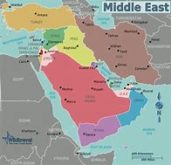Radiofarda – Friday Prayer leaders in Tehran and other cities have expressed their opposition to negotiating with the United States, a topic that has stirred controversy in Iran since U.S.President Donald Trump said last week that he was prepared to talk with his Iranian counterpart, President Hassan Rouhani, “without any preconditions” to solve problems in their relations.
This comes while some Iranian diplomats have hinted that talks could start up between Tehran and Washington “at a lower level.”
The contents of Friday Prayer sermons are coordinated at the Friday Prayer Headquarters, a body affiliated with the office of Iranian Supreme Leader Ayatollah Ali Khamenei.
Tehran’s Friday Prayer leader, Ayatollah Kazem Sediqi, said in his sermon on August 3, “If one day we decide to negotiate, it is not going to be with the current U.S. administration and the current president,” reported Mehr news agency.
Sediqi said, “The U.S. president is a wolf dressed as a man,” adding, “We have seen that Americans did not respect their commitments about the nuclear deal with Iran.”
Meanwhile, Ayatollah Seyed Ahmad Miremadi, the Friday Prayer leader of Khorramabad and Khamenei’s representative in Lorestan Province, said in his sermon, “Trump’s offer of negotiations with Iran was a populist act.”
He said the solution for Iran’s problems lies in reliance on domestic capabilities rather than on negotiating with America, adding, “Trump exerts pressure on Iran and wants to tell the world that he is open to negotiations, but Iran is not,” Mehrquoted him as saying.
“Trump’s suggestion aims at dividing Iranian officials,” he said.
In Tabriz, Ahmad Motahari, who led prayers on Friday, said he was not optimistic about possible negotiations with the United States and said Trump wants to “frustrate” Iranians so that they would blame their own leaders for sanctions.
The Friday Prayer leader of Ghazvin, Ali Qabel, said,”Trump’s offer of talks with Iran is deceitful, although it has tempted some Iranian officials,” and added that “Iranian officials should not be deceived by America once again.”
Qabel said elsewhere in his sermon, “The U.S. president is a liar and tells seven lies every day.” He said he borrowed the figure about Trump’s “lies” from Western media.
Similar remarks were also made by the Friday Prayer leader in the town of Quds, 20 kilometers west of Tehran, where Seyed Abolqasem Mirahmadi used almost the same words as his counterparts in Ghazvin and Khorramabad.
The similarity between sermons across the country highlightsthe concerted move to disparage Trump’s offer of talks with Iran by a body linked to Khamenei’s office.
Previously, IRGC commander Mohammad Ali Jafari had ruled out talks between Iran and the United States, saying, “The Iranian nation will not allow their leaders to hold talks with Americans.”
Regardless of the negative response among hard-liners close to Khamenei, analysts argue that Khamenei might be willing to give the go-ahead to state officials to sit at the negotiating table with U.S. officials. That was when Khamenei coined the term “heroic flexibility” prior to the 2015 nuclear agreement with the United States and other world powers.
Remarks by Iranian diplomats indicate that Iran may be ready to hold talks, but they are not certain they would want to trust a negotiating party that has left a previous agreement with Tehran.
Iran’s UN envoy, Gholamali Khoshru, told Etemad newspaper on July 31 that “talks can start at a lower level” before the two countries presidents can sit down together.
Iran’s former diplomat in London, Nosratollah Tajik, echoed the same stance in an interview with the Iranian Labor News Agency (ILNA) on August 3.
 Shabtabnews In this dark night, I have lost my way – Arise from a corner, oh you the star of guidance.
Shabtabnews In this dark night, I have lost my way – Arise from a corner, oh you the star of guidance.



